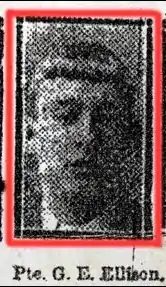George Edwin Ellison
George Edwin Ellison (10 August 1878 – 11 November 1918) was the last British soldier to be killed in action during the First World War. He died at 09:30 am (90 minutes before the armistice came into effect), shot by a sniper while on a patrol in woodland on the outskirts of Mons, Belgium.
 Pte. George Edwin Ellison | |
| Birth name | George Edwin Ellison |
|---|---|
| Born | 10 August 1878 York, England |
| Died | 11 November 1918 (aged 40) Mons, Belgium |
| Allegiance | |
| Service/ | |
| Years of service | 1902–1912 1914–1918 |
| Rank | Private |
| Unit | 5th Royal Irish Lancers |
| Battles/wars | First World War |
Biography
Ellison was born in York and later lived in Leeds, England. He first joined the British Army as a regular soldier in 1902 - but had left by 1912, by which time he had become a coal miner, and when he married Hannah Maria Burgan in Nottingham. Sometime just before the outbreak of war he was recalled to the army, joining the 5th Royal Irish Lancers and serving in the army from the very start of the war. He fought in the Battle of Mons in 1914, and several other battles including the Battle of Ypres, Battle of Armentières, Battle of La Bassée, Battle of Lens, Battle of Loos, and Battle of Cambrai on the Western Front.
Ellison, aged 40 at the time of his death, is buried in the St Symphorien Military Cemetery, just southeast of Mons.[1] Coincidentally, and in large part due to Mons being lost in the very opening stages of the war and regained at the very end (from the British perspective), his grave faces that of John Parr, the first British soldier killed during the Great War,[2][3] and just a few metres away from George Lawrence Price, the Canadian soldier who was also felled near Mons at 10:58am, and was the last British Empire soldier killed in the Great War.
He was survived by Hannah and a son, James Cornelius (just five days short of his fifth birthday when his father was killed) – living in Richmond Hill in east Leeds, as were Ellison's parents. The family only learnt of his death just before Christmas, more than a month after the war had ended. Ellison's only brother Frederick was also killed during the war, in 1917.[4]
In recent times, Ellison's story was featured in a 2008 BBC 'Timewatch' documentary with Michael Palin, in conjunction with his granddaughters.[5]
Then in 2018, he and John Parr became the inspiration behind a poem, "Goodnight Kiss", by writer Philip Parker - written as part of a project in conjunction with the Imperial War Museums.[6]
And in November 2018 (the centenary of his death at the very end of the war), Leeds Civic Trust and partners unveiled a memorial plaque to him at Leeds railway station (pictured below), paid for via a public crowdfunding campaign. The Civic Trust’s plaques are usually blue, but Ellison’s is olive green to symbolise the uniform of the soldiers. The unveiling event, on 7 November, garnered considerable media coverage, and was attended by his two granddaughters and other family members.[7][8] A memorial mock newspaper was created and circulated at the event, marking Ellison's life and the story of the war as experienced by regular people in Leeds.[9]
Following the unveiling of the plaque, Leeds artist Suman Kaur heard Ellison's story, and created and circulated a 'remastered' charcoal portrait of him based on the only known photo of him.[10] Note that various websites (one of which is featured in the footnote below) still incorrectly feature a different and much clearer portrait - but this has been proven to be someone else completely.[11]
.jpg.webp)
References
- "Casualty Details: Ellison, George Edwin". Commonwealth War Graves Commission. Retrieved 13 November 2010.
- Lichfield, John (8 November 2008). "Two soldiers linked in death by a bizarre coincidence". The Independent. Archived from the original on 12 December 2008. Retrieved 7 November 2018.
- Palin, Michael (1 November 2008). "The last day of World War One". Timewatch. BBC. Retrieved 7 November 2018.
- Boffey, Daniel (Nov 2, 2018). "Armistice: two men separated by four years of war and a few yards of turf". Retrieved Sep 6, 2020 – via www.theguardian.com.
- Palin, Michael (29 October 2008). "The grandfather we never knew". Timewatch. BBC. Retrieved 24 April 2011.
- Parker, Philip. "Goodnight Kiss". Imperial War Museum, "Armistice 100 Days". Retrieved 23 October 2018.
- Ottewell, David; Hyde, Nathan (Nov 7, 2018). "The Leeds man who became the last British soldier to be killed in World War One". LeedsLive. Retrieved Sep 6, 2020.
- "Armistice: Plaque unveiled in honour of George Edwin Ellison, the last British soldier killed in First World War". inews.co.uk. Nov 7, 2018. Retrieved Sep 6, 2020.
- "George Ellison newspaper 2018". ImgBB. Retrieved Sep 6, 2020.
- "New drawing is fine tribute to Leeds war hero George Ellison". www.yorkshireeveningpost.co.uk. Retrieved Sep 6, 2020.
- Sites (www.communitysites.co.uk), Community. "Nottinghamshire links | George Ellison: The Last Man killed in WW1 | THE FIRST WORLD WAR IN NOTTINGHAMSHIRE | Notts Topics | Our Nottinghamshire". www.ournottinghamshire.org.uk. Retrieved Sep 6, 2020.
Further reading
- Lazenby, Peter (7 November 2008). "Leeds soldier who was last to die in Great War". Yorkshire Evening Post. Archived from the original on 5 May 2013. Retrieved 24 April 2011.
- Palin, Michael (29 October 2008). "Remembering Private Ellison". BBC News. Retrieved 24 April 2011.
External links
 Media related to George Edward Ellison at Wikimedia Commons
Media related to George Edward Ellison at Wikimedia Commons